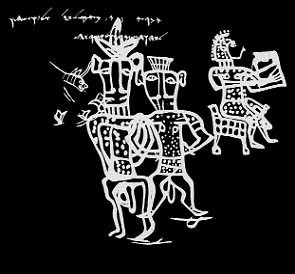I'm introducing some new features on NYAPIKORES. First, each blog entry will contain a brief synopsis of key events that occurred on that day in the life of the Jewish People, with an emphasis on the forgotten past -- essentially pre-World War II. So here we go: on this day in 1895, Captain Alfred Dreyfus, accused of treachery, was publicly degraded in Paris, in the face of his cries of innocence. He was deported to Devils Island soon after. Theodore Herzl would soon be aroused to kick start the Zionist movement.
Apart from 'this day in the Jewish life', I'm introducing a weekly feature to appear on Fridays. This will be a brief comment on the weekly portion in the ancient NYAPIKORES tradition...
This week's parsha (portion) is Vayekhi ('And he lived'), the last section in Breishit (Genesis), the centerpiece of which are Jacob's blessings to his sons on his deathbed. While devout Jews view the blessings as prophecy, they are actually a reflection of many tribal realities as they existed during the Judges and monarchy periods (which began hundreds of years after the purported events reported in this weeks portion were to have occurred). These later events were then projected back into the semi-mythical Israelite past, to be retold and discussed as allegories. Judah and Efraim (one of Joseph's sons -- traditionally Joseph ended up with two tribes named after his two sons: Efraim and Menashe) received the best blessings of all from Jacob, and lo and behold, they were to become the two leading, and eventually rival, tribes.
There are many interesting insights to glean from the blessings, but we'll touch on only a few. For example Yisakhar, comes from two words, Yesh Sakhar, or 'have salary' - seems the Yissakharites were paid laborers of the Canaanites. Benjamin is called a killer wolf, which may be an allusion to the horrible story of Pilegesh BaGiv'a (the concubine of Giv'a), itself a close facsimile of the story of Sodom. I'll discuss that another time.
Anyway, I'd like to dwell (I'm supposed to keep this short, right?) on the list of brothers (tribes) which is the traditional lineup most familiar. Reuven Shimon Levi Yehuda etc. I'll assume that you're familiar with the list, and if not you can look it up in the portion. Now, one would assume that the tribal roster wold remain consistent through the Tanach. But this isn't so. In Dvarim (Deuteronomy) 33, Shimon is absent from Moshe's series of blessings to the tribes. Why?
Meanwhile, Shoftim (Judges) 1, features a very different list, in which Joseph is an independent tribe apart from his sons Efraim and Menashe. Reuven, Gad, Levi and Yisakhar are absent. Odd.
Finally in Shoftim 5, which contains the very ancient Song of Devora, we find yet another roster.
Here, not 12 but 11 tribes are mentioned. Three are not sons of Jacob: Machir, Gil'ad, and Meroz. Five on the traditional list are absent: Shimon, Levi, Yehuda, Menashe and Gad. Hmmm...
Its been observed by many scholars for a variety of reasons that its likely that the traditional list is most recent, while the roster in Devora's Song is most ancient.
Its not surprising that in general yeshiva students aren't urged by their rabbis to study the prophets and writings. Exposure to these neglected parts of the Bible would raise too many questions in their minds, bring attention to inconsistencies and even raise doubts in their innocent minds as to the divine authorship of the Torah. Who needs such trouble?
Shabbat Shalom.
Subscribe to:
Post Comments (Atom)

No comments:
Post a Comment